How to Choose Eco-Friendly Party Supplies for a Sustainable Celebration
Host a festive, eco-conscious party with these alternatives to traditional décor.
:max_bytes(150000):strip_icc():format(jpeg)/21019_JM_20200622_MSL8529-horiz-8d7f86a245d74447a0e67c4b9cb0f48e.jpg)
Johnny Miller
Nothing spoils the end of a memorable party like seeing garbage bags full of waste: disposable party supplies, plastic plates and cups, leftover food, and popped balloons.
For your next event, large or small, celebrate Mother Nature, too, by choosing eco-friendly party supplies that won't leave their mark on the planet. From biodegradable tableware to balloon arch alternatives, follow these expert guidelines to create a more sustainable celebration.
Related: 10 Eco-Friendly Household Swaps That Make Living "Green" So Much Easier
Take a Hard Pass on Plastic
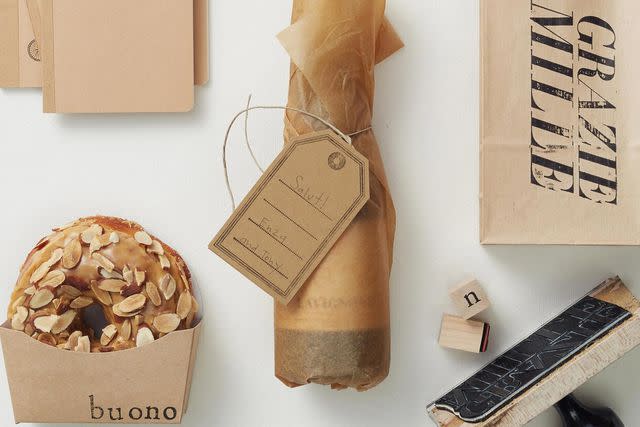
Bryan Gardner
Whether you're choosing tableware, decorations, or favors, one of your top party priorities should be avoiding plastic. "Even 'recyclable' plastic is not always recyclable and is certainly never good for the planet," says Liz Brown, chief sustainability officer at sustainable event space ILA Penthouse.
Lauren Olson, zero waste manager for World Centric, details the finicky process of recycling used plastic. "To be recycled, items like plastic-lined plates or plastic cups have to be clean, correctly sorted by resin type, and free of any food residues," she says. "When plastic is unable to be recycled, it ends up in a landfill where it can take hundreds of years to decompose." Instead, opt for biodegradable paper options or, better yet, reusable items. "Convenience is the main culprit here, and planning well in advance is your key," says Brown.
Choose Low-Waste Invitations
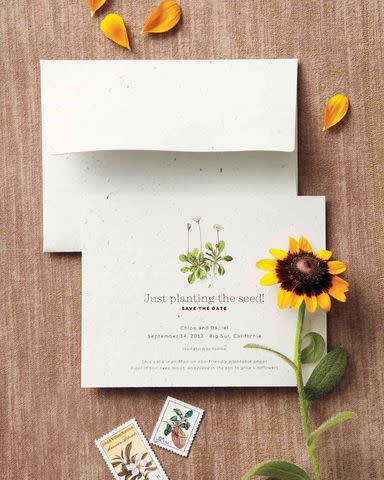
Martha Stewart
Set the tone for your eco-friendly party with an invitation less wasteful than sending out tons of paper. Digital invitations are the most eco-friendly, but you can also consider seed paper stationery: a special type of eco-friendly paper made from post-consumer materials, then studded with seeds (wildflowers, vegetables, and more) that guests can plant or pot. If you do send traditional paper invitations, says Calvert Crary, executive director at ILA Penthouse, remember to skip the plastic or vellum sleeve.
Related: 23 Simple Ways to Live Every Day More Sustainably
Set a Sustainable Table
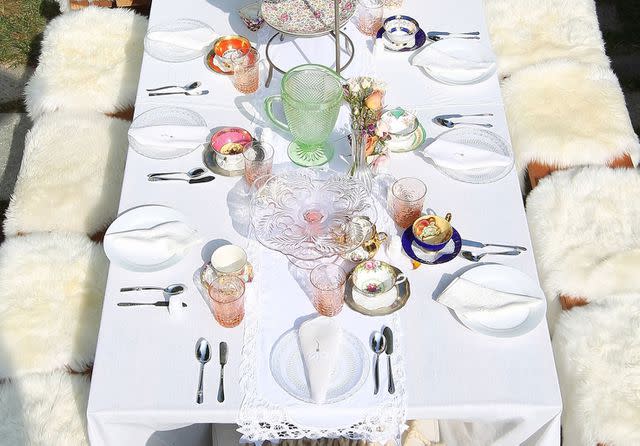
Louis Revolution Pic
Plastic plates, cups, and flatware may make your post-party cleanup a little easier, but they should be the first thing you cut from the supply list. Instead, design a place setting around reusable items or thrifted finds, mixing and matching pieces for a completely custom look. "Borrow from friends, browse Goodwill, or rent a set if you need extras," says Natalie Lennick, founder of Green Ablutions.
Sourcing long-lasting dishware from a company with a solid sustainability ethos is another choice; Crary's team uses Costa Nova recycled stoneware dishes "that hold up beautifully in an industrial dishwasher," he says.
But if reusables aren't practical, the next best option is to use plates and bowls that are made from unbleached, plant-based materials like fiber or bagasse, not plastic or foam, says Olson. Products made of sugarcane or bamboo pulp are also good options. If you're unsure, keep an eye out for words like "certified compostable" or "biodegradable" (Crary recommends products from Bio & Chic).
Related: 10 Things You Should Thrift Instead of Buying New
Look for Natural Linens
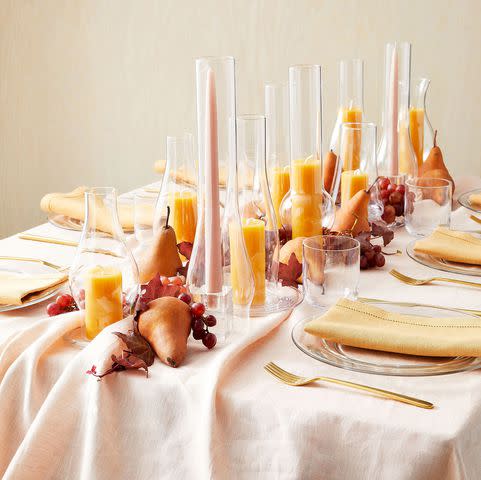
Brown suggests tablecloths and napkins made from natural fibers and choosing upcycled or recycled material and plant-based dyes whenever possible. "Not many linen rental businesses will have these types of options, so you may need to purchase," she says. "You can also ask what their sustainability practices are to see if their business is aligned with your ethics." Your venue may already stock tablecloths, which is better than buying new; Brown's team has a set from NuAge Design for clients to use.
And don't forget to check out your favorite secondhand shop for table linens—oftentimes, you can find tablecloths and napkins prettier than those you can buy new.
Decorate Responsibly

Along with single-use tableware, latex and mylar balloons are two major culprits in your party's carbon footprint (neither is recyclable nor biodegradable)—and they inevitably become a risk for wildlife, too. "Replace plastic, mylar, or balloon décor with paper arches, paper lanterns, and other paper décor, flowers, or fabric backgrounds," says Brown. (This means no plastic or mylar confetti, too.) Other festive touches can include edible décor, centerpieces that can also serve as parting gifts, or floral installations (just make sure your florist avoids plastic holders or floral foam). "Designing with natural materials, such as flowers, herbs, plants, and vegetables is always a fun way to create the mood," says Crary.
Other party decorations should be chosen just as carefully. "At your photo booth, opt for paper props and other things that you might already own," says Brown. "For example, you could have art or other décor at your event that is going back to your home, or [that] you plan to gift. Always think about the least amount of garbage, and always ask yourself, is there a non-disposable option? Can I re-use this again? Do I need it? Can this be gifted?"
Related: Easy-to-Make Paper Decorations For Your Wedding
Compost, Recycle, Donate
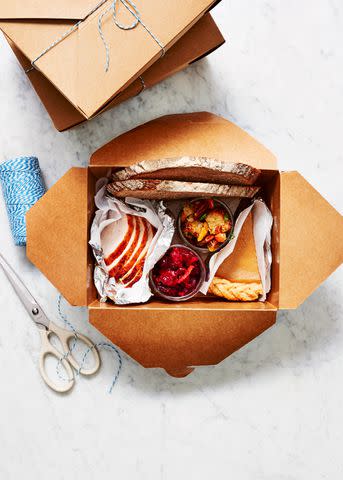
While the most eco-friendly option is often using less instead of more, your party's garbage disposal plan should work oppositely. Setting up multiple receptacles to sort recycling, garbage, and compost allows you to minimize the amount of trash that ends up in a landfill. "Dispose of all organic matter into compost bins—this includes food, paper and organic décor, and other biodegradable disposables," says Crary. To lower your food waste output, have biodegradable take-out boxes on hand to send food home with guests. Alternatively, Brown recommends connecting with a local food bank that may be able to pick up extra meals and leftovers after your event.
Related: A Beginner's Guide to Composting, According to Experts
Buy Local
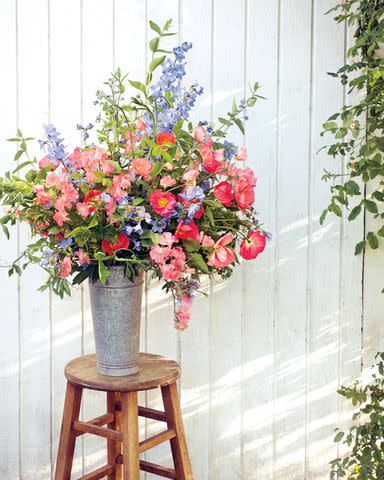
Avoid the carbon footprint of major retailers by turning to your local florists, designers, and suppliers for your party décor. "Working with local small businesses and artists might be more expensive and time-consuming, but you will have more control over your final product, materials, and practices, and something that is crafted personally for you," says Brown. "Better for the planet means better for us; every dollar spent is a vote for future behavior. Think about where you are spending your time and energy. All it takes is creativity, a good eye for design, and time to properly plan."
Read the original article on Martha Stewart.
